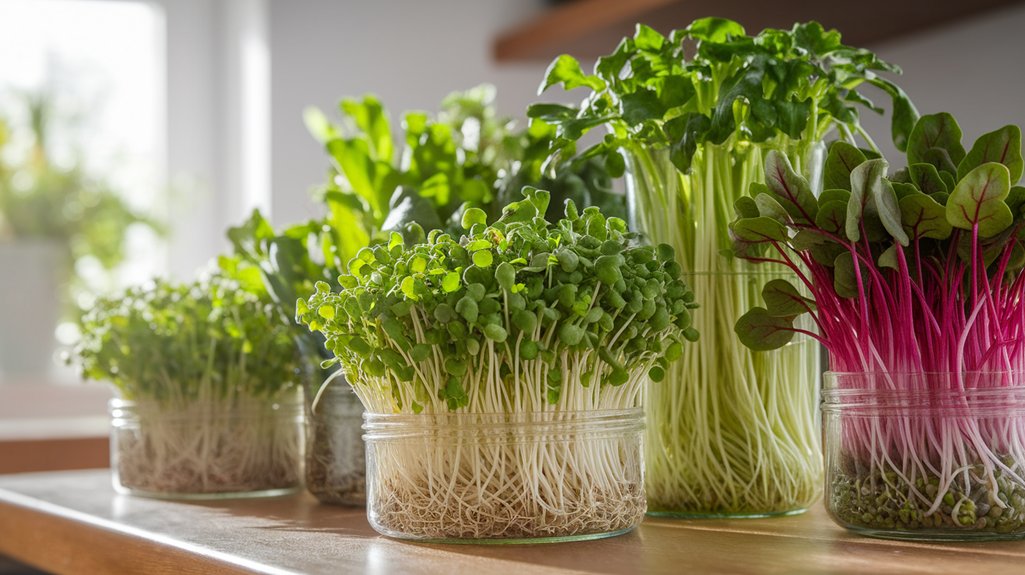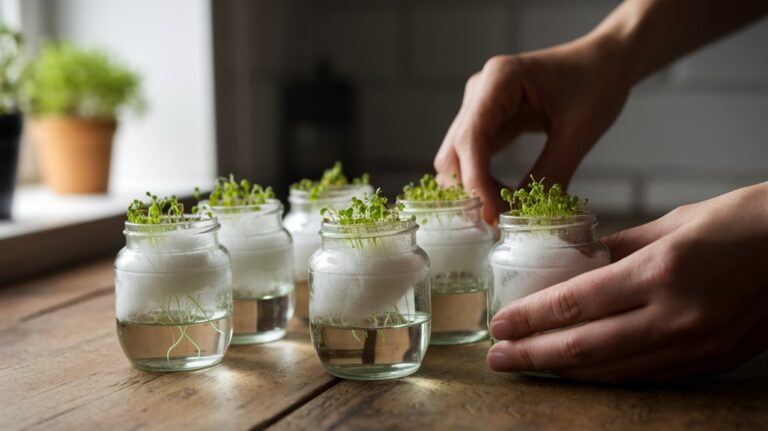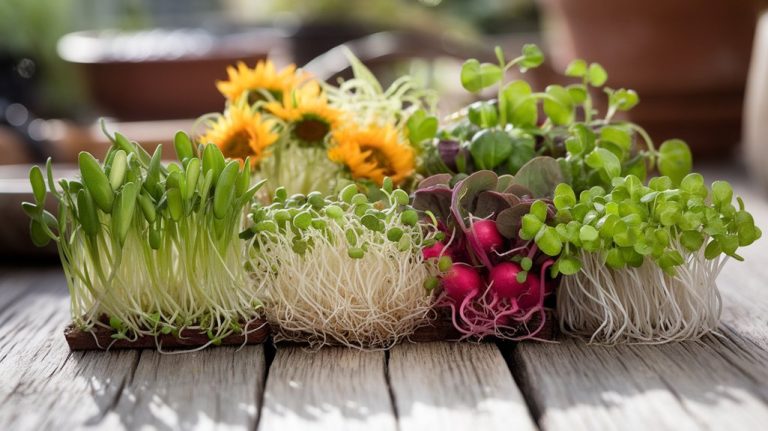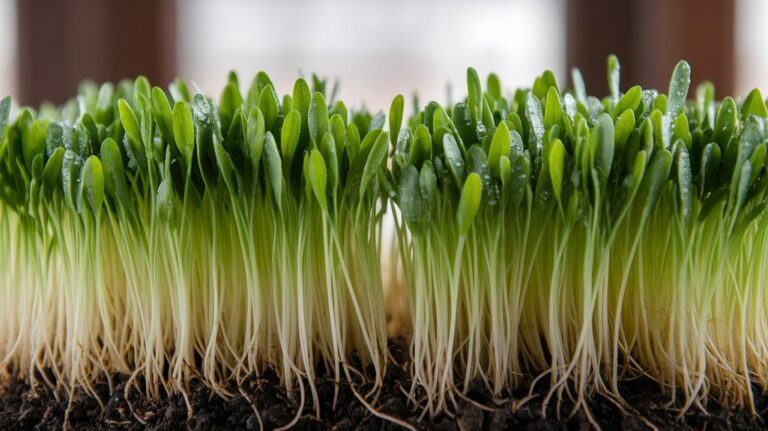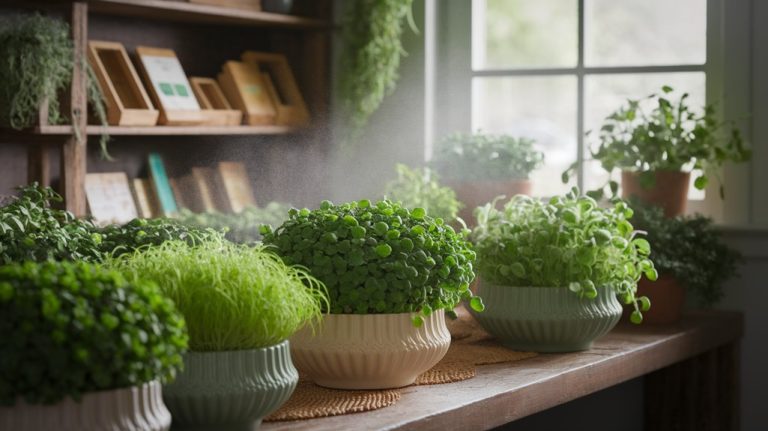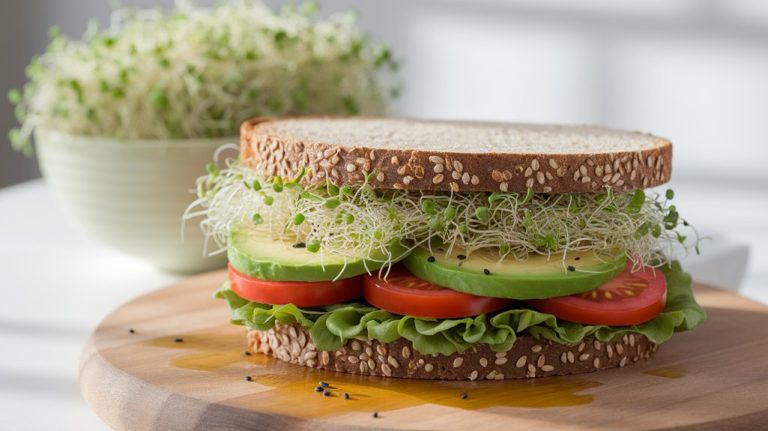The Benefits of Growing Your Own Organic Sprouts
Growing my own organic sprouts has become a rewarding experience. They’re packed with vitamins, minerals, and antioxidants, making them a nutritious addition to my meals. Plus, it’s cost-effective; I can start with just a small investment. Home sprouting also helps the environment by reducing my carbon footprint and water use. The versatility in cooking is amazing — they add crunch and flavor to so many dishes. Want to discover even more benefits? Let’s explore further.
Key Takeaways
- Growing your own organic sprouts provides a dense concentration of vitamins, minerals, and antioxidants, enhancing your nutrition.
- It is cost-effective, requiring minimal supplies and reducing grocery expenses significantly.
- Home sprouting reduces your carbon footprint by eliminating transportation and packaging waste.
- The process is quick and simple, with sprouts ready to harvest in just a few days.
- Organic sprouts are versatile in cooking, adding flavor and texture to various dishes.
Nutritional Benefits of Organic Sprouts
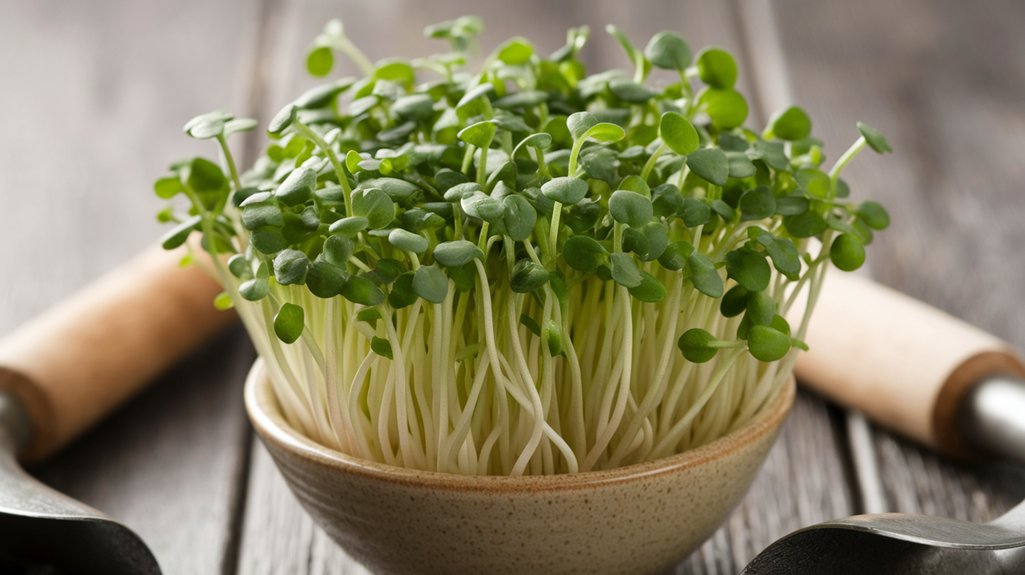
When I think about the nutritional powerhouse that’s organic sprouts, I’m often amazed by their dense concentration of vitamins and minerals.
These tiny greens pack a serious punch, offering a rich source of vitamin C, vitamin K, and several B vitamins. They’re also loaded with essential amino acids, making them a great protein supplement in a plant-based diet.
Sprouts are high in antioxidants, which help combat oxidative stress in our cells. Additionally, they contain fiber that supports digestive health and aids in maintaining a healthy weight.
Cost-Effective Gardening
When I started growing my own organic sprouts, I was pleasantly surprised by how low the initial investment was.
With just a few simple supplies, I quickly began to see a significant reduction in my grocery expenses.
Not only do I enjoy fresh, nutritious sprouts, but I also save money in the process.
Low Initial Investment
Starting your own organic sprouts can be done with as little as ten dollars, making it an incredibly cost-effective gardening option.
I’ve found that this low initial investment opens up a world of fresh, nutritious food without breaking the bank.
Here are some key points to consider:
- Minimal Supplies: All you need is a jar, some seeds, and water. It’s that simple!
- Fast Growth: Sprouts can be ready to eat in just a few days, maximizing your investment.
- Space Efficiency: You don’t need a garden; a countertop works perfectly for sprouting.
Reduced Grocery Expenses
While many people overlook the potential savings from growing their own organic sprouts, I’ve discovered that this simple practice can significantly reduce grocery expenses.
Each week, I harvest fresh sprouts that would typically cost me several dollars at the store. For just a small investment in seeds and a jar, I can produce a bounty of nutritious sprouts right at home.
This not only cuts costs but also ensures I’m eating fresh, chemical-free produce. Plus, sprouts are incredibly versatile; I toss them in salads, sandwiches, and smoothies.
Over time, I’ve noticed that my grocery bills have dropped as I rely less on store-bought greens. Embracing homegrown sprouts has proven to be both economical and rewarding.
Environmental Impact of Home Sprouting
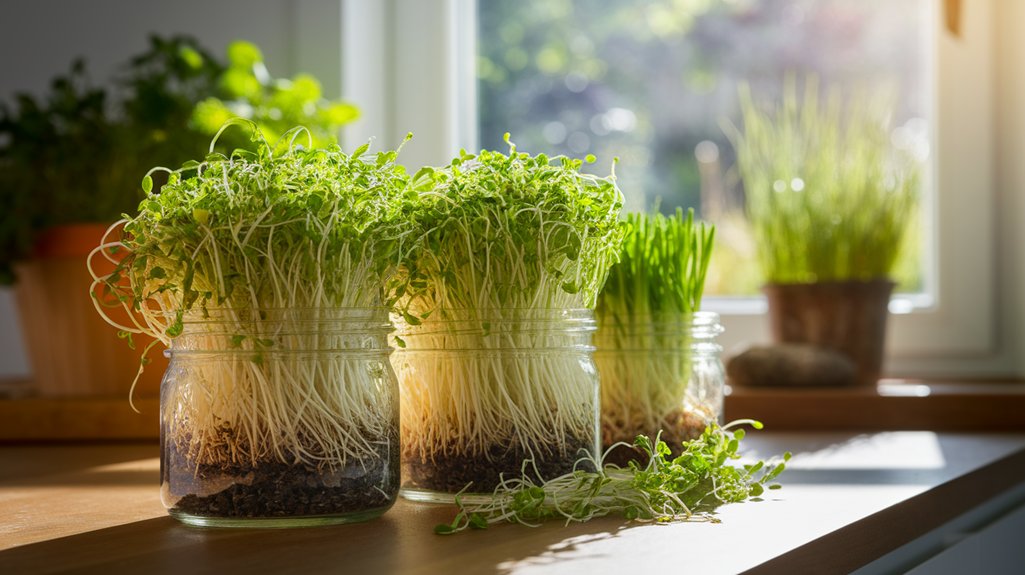
Although many mightn’t realize it, home sprouting offers significant environmental benefits that extend beyond personal health. By growing your own sprouts, you actively contribute to a more sustainable food system.
Here are a few key impacts I’ve noticed:
- Reduced Carbon Footprint: Home sprouting eliminates the need for transportation, packaging, and refrigeration of store-bought sprouts, lowering greenhouse gas emissions.
- Water Conservation: Sprouts require significantly less water than traditional crops, making them a smart choice for resource conservation.
- Biodiversity Support: By choosing a variety of seeds, I can promote agricultural diversity and support local ecosystems.
Culinary Versatility and Flavor Enhancement
When I think about the culinary versatility of sprouts, I’m amazed at how they can enhance so many dishes.
These tiny powerhouses not only add a fresh crunch but also deliver a flavorful nutritional boost that elevates any meal.
Whether sprinkled on salads or blended into smoothies, their freshness truly makes a difference in every bite.
Diverse Culinary Applications
As I explore the culinary world, I find that organic sprouts offer incredible versatility and can significantly enhance the flavor profile of a dish. Their crisp texture and fresh taste can elevate both simple and complex recipes.
I love incorporating sprouts into my meals, whether I’m adding them to salads, sandwiches, or stir-fries.
Here are a few diverse culinary applications for organic sprouts:
- Enhancing Salads: Their crunchiness adds dimension, making greens more exciting.
- Garnishing Dishes: They provide a colorful, nutritious touch on top of soups and main courses.
- Incorporating into Wraps: Sprouts can give an extra layer of flavor and texture, transforming a basic wrap into something special.
Experimenting with sprouts can truly inspire creativity in the kitchen!
Flavorful Nutritional Boost
Not only do organic sprouts add a delightful crunch to meals, but they also pack a powerful nutritional punch that can transform your dishes. Their unique flavors range from nutty to peppery, enhancing everything from salads to sandwiches. Here’s a quick breakdown of some popular sprouts and their benefits:
| Sprout Type | Flavor Profile | Nutritional Benefit |
|---|---|---|
| Alfalfa Sprouts | Mild, nutty | Rich in vitamins A, C, E |
| Radish Sprouts | Spicy, peppery | High in antioxidants |
| Broccoli Sprouts | Earthy, slightly bitter | Contains sulforaphane |
| Clover Sprouts | Sweet, grassy | Good source of fiber |
Incorporating these sprouts into your meals not only boosts flavor but also elevates the nutritional value, making your dishes more wholesome.
Freshness in Every Bite
Incorporating organic sprouts into my meals not only elevates the freshness but also enhances the culinary experience with their diverse flavors.
These tiny powerhouses bring a unique crunch and a burst of taste that can transform any dish. Their versatility allows me to experiment in the kitchen, adding them to salads, sandwiches, and stir-fries.
Here’s why I love using organic sprouts:
- Nutrient Density: They’re packed with vitamins, minerals, and antioxidants, making every bite a health boost.
- Flavor Profile: Sprouts like radish or alfalfa offer peppery or nutty notes, enriching the overall taste.
- Culinary Creativity: They inspire me to think outside the box, enhancing both texture and presentation in my meals.
Growing my own ensures they’re fresh and chemical-free.
Easy and Quick Growth Process
While you might think growing your own organic sprouts requires specialized skills, it’s actually a simple and quick process that anyone can master. I started with just a jar and some seeds, and within days, I had fresh, crunchy sprouts ready to enjoy. Here’s a quick overview of what to expect:
| Day | Activity | Result |
|---|---|---|
| Day 1 | Soak seeds overnight | Activated seeds |
| Day 2 | Rinse and drain | Seeds start sprouting |
| Day 3 | Rinse twice a day | Tiny sprouts appear |
| Day 5 | Harvest | Fresh, edible sprouts |
From soaking to harvest, it’s rewarding to see how fast they grow. You won’t believe how easy it is to incorporate these nutrient-packed gems into your meals!
Engaging in a Sustainable Hobby
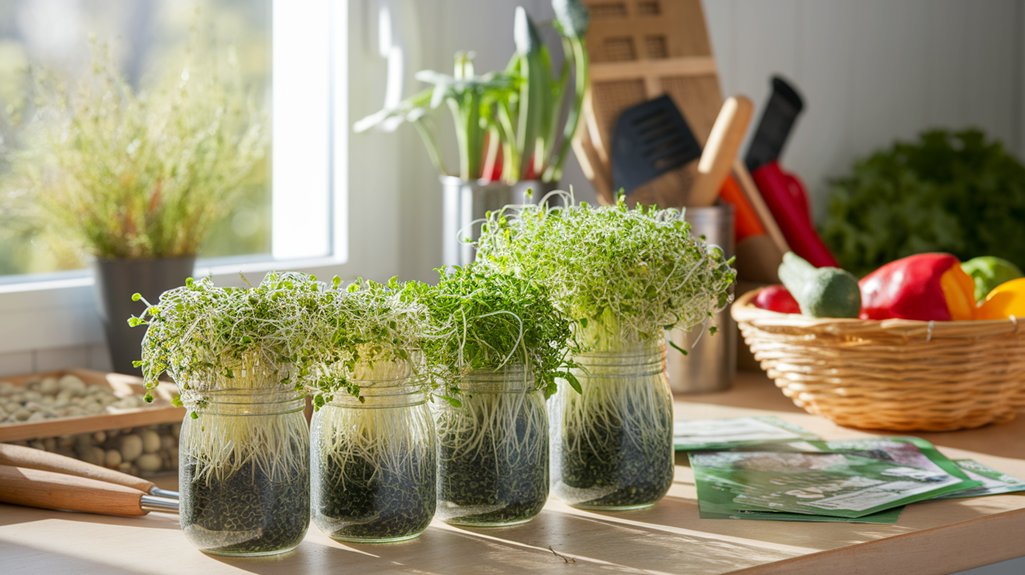
Have you ever considered how a simple hobby like growing your own sprouts can contribute to a more sustainable lifestyle? Engaging in this green activity not only benefits your health but also reduces your ecological footprint.
By growing sprouts at home, I’m minimizing transportation emissions associated with store-bought produce.
Here are some reasons why this hobby is impactful:
- Resource Efficiency: Sprouting seeds use minimal water and energy compared to conventional farming.
- Biodiversity Support: I can experiment with various seed types, promoting genetic diversity in our food system.
- Waste Reduction: Growing my own sprouts means less plastic packaging and food waste.
Embracing this hobby not only nourishes my body but also fosters a healthier planet.
Frequently Asked Questions
Conclusion
In conclusion, growing your own organic sprouts offers a wealth of benefits, from their impressive nutritional profile to the joy of cultivating them in your own home. Not only are they cost-effective and environmentally friendly, but they also enhance your meals with vibrant flavors and textures. Plus, it’s a rewarding hobby that connects you to nature. So why not give it a try? I guarantee you’ll appreciate the fresh taste and health advantages of your very own organic sprouts!

